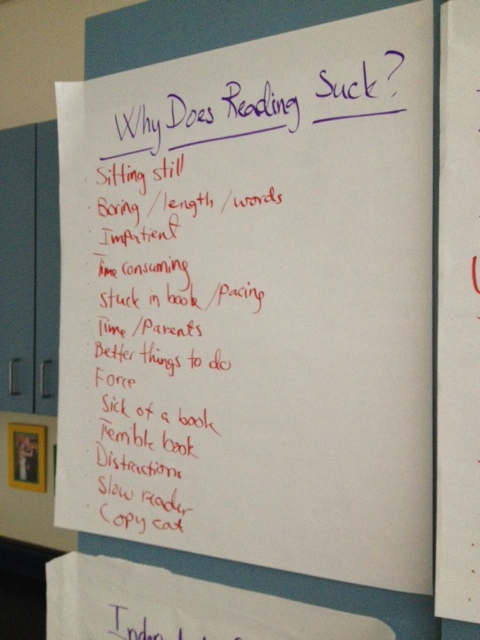Pernille Ripp is an elementary school teacher who believes in independent reading and is not afraid to tell the truth to her students. That’s also partly why her blog is so popular among educators.
In a recent post, “Why Reading Sucks and It’s Ok to Talk About It,” Ms. Ripp talks about what she did recently when a student shared that reading sucked. Instead of disagreeing with the student, she affirmed the student’s (current) feelings and even opened up a brainstorming session about all the possible reasons that reading might indeed suck. Here’s her chart:
It’s a pretty good list, don’t you think? (It’s particularly interesting to me how many reasons are connected to feelings of inferiority or stigma related to reading.)
It makes me happy that Ms. Ripp didn’t cower or get too teachery. Sometimes, I’ve felt like I have to offer a counter-narrative, something like, “Oh no! You can’t mean that! Reading is great! What you just said is a big fat lie!” That’s not quite right because it doesn’t validate the student’s opinion, what the student just said.
On the other hand, I’ve also been prone to affirm the student’s response almost too energetically, as if it’s really really OK to say that reading sucks. “Yes, I am so happy that you said that! You are right on the mark, Johnny. In fact, boys and girls, if you liked reading before Johnny just spoke, you should listen to Johnny because he’s cool and you want to be, too!” This approach doesn’t work, either.
Ms. Ripp’s response — which I think was to consider the student’s feelings matter of factly (but not too excitedly), to be honest that sometimes reading does suck (especially when there’s no choice involved), and to use the remark an opportunity to move through a common reaction to reading — seems perfect.
What do you think? Please go ahead and read her post (see below) and then let me know your thoughts.
Source: http://pernillesripp.com/2013/09/14/why-reading-sucks-and-its-ok-to-talk-about-it/

I do this when I teach art, on the first day of school. Giving students a place to vent about what they dont like and then letting them know I’ll support them when they hit a rough patch sets up the year well. It has also allowed me to scaffold lessons better.
I try a similar approach to math too. This year my less skilled 9th graders and I read “A Mathematician’s Lament” by Paul Lockhart, which critiques the way math is traditionally taught, and also says that math is an art, valid in its own right. We had a good conversation afterwards, which gave them space to talk about why they didn’t like math, and also opened the gate to the idea that math didn’t have to be that way.
Thanks for your comments, Heidi and Laura. I’m wondering (new folks, feel free to speak up, too): So often students will say that something sucks because they haven’t felt success in the subject. Other times, it’s what is deemed cool (particularly for ninth graders). And still other times, it’s the student’s actual feelings. So…when the class is live, and there at 30 new students in it, and let’s say that they’re ninth graders, how do keep that moment real but positive? Thanks!
I actually would share a personal story. I didn’t enjoy reading as a kid either. Now, as an adult, I still have a hard time finding something that keeps my interest. But, what I tell them is to do just that. Find something that will keep their interest. Most can believe that I, an English teacher, don’t really enjoy reading and that alone gets them interested. Then we spend a lot of time discussing pre-reading and making connections. Not every student ends up finding something that they will like, but I usually end up with a handful that go from never opening a book to reading an entire series. 🙂
Thank you for sharing your story, Teresa. I also didn’t love reading as a kid. I preferred playing baseball and the piano. But there were enough books that had a strong effect on me. My hope is that my students, whether or not they see themselves as avid readers, will feel the same way — that there are books out there my students can call their own.